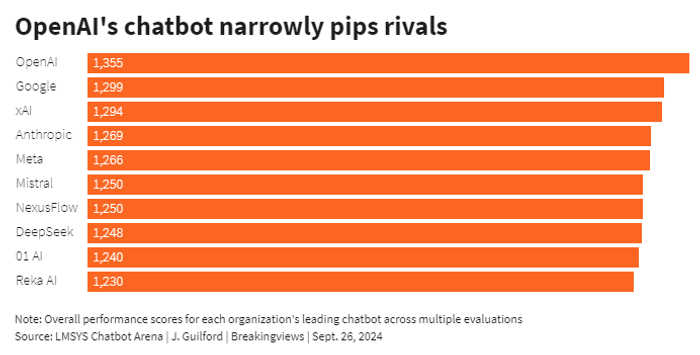Published 13:55 IST, September 27th 2024
OpenAI pushes limits of tech pivoting
ChatGPT is on the verge of marginalizing any concern for humanity to instead focus on power and profit.
- Technology
- 4 min read

Artificial sweetener. In classic tales of science fiction, rapid technological advancements herald immense potential, while nervous inventors argue for guardrails to prevent everything from getting out of hand. In the case of generative artificial intelligence, the dangers of machines learning to think like people sound all too real. And as typically happens in imagined storybook futures, the company behind ChatGPT is on the verge of marginalizing any concern for humanity to instead focus on power and profit.
These dueling forces have caused turmoil for years at OpenAI, co-founded and led by Sam Altman. Started as a nonprofit in 2015, the chatbot maker has butted up against the need for copious amounts of cash to fund the vast computing resources AI devours. Similar tensions led to a split with onetime backer and Tesla boss Elon Musk in 2018, before OpenAI established a “capped-profit” subsidiary to attract billions of dollars from Microsoft and others. The nonprofit board kept a firm grip to ensure that it could, if needed, slow developments to ensure safety. When it tried to fulfill its mission by firing Altman last year, it was too late: Microsoft used its influence to help undo the decision.
The schism effectively left OpenAI’s governance as little more than lip service. A possible record fundraising, which would impute a $150 billion valuation, sets the stage to codify one of the most radical pivots, or shifts in strategy, in an industry renowned for them. Backers would be injecting capital into a tech firm whose chief technology officer, among many others, is decamping, a concession hard to fathom anywhere else in Silicon Valley. The board would be demoted to a minority equity holder and OpenAI transformed into a for-profit entity, Reuters reported. Altman, previously unpaid, might be in line for a 7% stake, worth almost $11 billion on paper.
Modern capitalism adheres to the idea that equity aligns incentives: what’s good for the boss is good for investors. Both Altman and OpenAI may soon be very successful indeed. The hitch is that OpenAI long held that dominance could not be its controlling mission.
A chemicals manufacturer could poison the air, or a construction outfit might bribe local officials, but regulators are keeping watch. As Altman himself has warned, however, artificial intelligence poses a possible existential threat, one that governments cannot control. He reassured the U.S. Senate last year that OpenAI’s structure blunts the incentive to produce such dangerous technology. Pay that rewards growth changes the story.
This outcome was probably inevitable. OpenAI does not operate in a vacuum. Others are racing to catch up, including Google , Meta Platforms, Amazon.com, and even Musk’s own xAI. According to evaluations collated by LMSYS Chatbot Arena, second-place Google is only narrowly ahead of the tenth-place peer. OpenAI is uniquely ahead of the pack for now, but all these margins are slim. The lead may not last long.

With so much money at stake, survival is paramount and thus AI leaders will be commensurately motivated. OpenAI has tried to paper over its competitiveness with various fig leaves. With trustbusters scrutinizing its relationship with Microsoft, the software giant surrendered its non-voting board seat. OpenAI, however, simply started briefing all investors. Altman recently left the safety committee to ensure independence, yet the committee must work with the full board to delay products. Put simply, OpenAI has only the thinnest veneer of security.
Unless, of course, all the doomsaying is overblown. During its vertiginous rise, many AI developers issued dire warnings. The cynical view is that this was convenient: how better to lure investment and government support than to hype up a new product as the highest possible strategic priority? On that basis, fearmongers are no longer useful with money rolling in at breakneck speed.
A darker possibility is that OpenAI’s radical pivot to profit is precisely what admonishers feared. One of the few remaining safeguards may be the senior staff defections. Altman and his investors, however, are putting their faith in science while brushing aside desperate warnings as mere fiction.
Context News
OpenAI, the artificial intelligence firm that developed chatbot ChatGPT, is working on a plan to restructure as a for-profit benefit corporation, Reuters reported on Sept. 25, citing unnamed sources. The business is currently structured as a "capped-profit" subsidiary, in which investors can buy a stake and realize returns of up to 100 times, while a nonprofit board maintains governance control. As part of the restructuring, boss Sam Altman may receive an equity stake of 7%, Bloomberg reported, also citing unnamed sources. Changes to the company's structure are integral to clinching a $6.5 billion funding round that would value OpenAI at $150 billion, Reuters previously reported.
Updated 13:55 IST, September 27th 2024